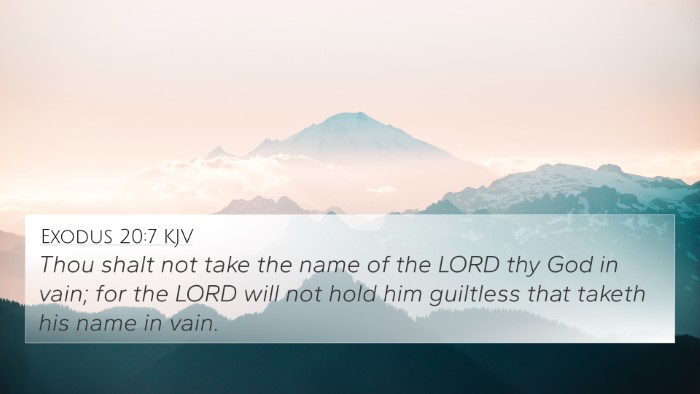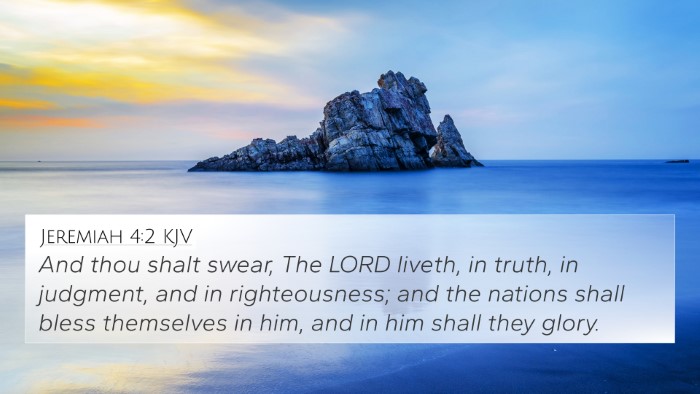Meaning and Interpretation of Genesis 24:5
Genesis 24:5 reads: "And the servant said unto him, Peradventure the woman will not be willing to follow me unto this land: must I needs bring thy son again unto the land from whence thou camest?" This verse contains a critical moment in the narrative of Abraham's servant as he seeks a wife for Isaac, reflecting the themes of faith, guidance, and divine providence.
Contextual Overview
This verse occurs within a larger narrative concerning the quest for a wife for Isaac, Abraham's son. Abraham is adamant that Isaac should not marry a Canaanite woman, insisting instead that the chosen bride should come from his own relatives in Mesopotamia. The servant is given a solemn task and must navigate the complexities of this assignment with faithfulness and prayer.
Commentary Insights
Several key commentaries provide deeper insights into this verse:
-
Matthew Henry: Henry emphasizes the servant's dilemma, noting that he is aware of the cultural and social implications of his mission. He highlights the importance of the servant’s prayer and dependence on God’s leading in discerning the right choice for Isaac's wife. The servant’s query reflects his understanding that the will of God is paramount in such decisions, and he aims to act wisely.
-
Albert Barnes: Barnes notes that the servant's question reveals an awareness of human will. He argues that it underscores the uncertainties the servant faces regarding the woman's willingness to leave her home. This inquiry points to a broader theme of commitment and the challenges faced when responding to divine directives.
-
Adam Clarke: Clarke comments on the servant's faithfulness and loyalty to Abraham. He indicates that the servant acknowledges the possibility of rejection and prepares himself for various outcomes. Clarke also discusses the significance of the servant's role as a type of the Holy Spirit, who seeks and leads us to Christ.
Cross-References for Genesis 24:5
Genesis 24:5 is interwoven with various themes present throughout the scripture. Here are some relevant cross-references:
- Genesis 12:1-3 - God's call to Abraham emphasizes the importance of leaving one's homeland for divine purposes.
- Genesis 22:2 - The sacrifice of Isaac foreshadows the significance of Abraham's descendants.
- Genesis 24:51 - The servant's report of the family's willingness showcases God's providence in relationships.
- Ruth 1:16 - Ruth's declaration of loyalty has parallels with the commitment expected of Isaac’s bride.
- Isaiah 61:5 - This verse signifies how God chooses those who might seem unlikely for His purposes, linking to the servant's quest.
- Acts 1:24-26 - The apostles sought divine direction in selecting a replacement for Judas, highlighting similar themes of guidance.
- John 16:13 - The Holy Spirit guides believers into truth, akin to the servant's reliance on God for guidance.
Thematic Connections
Genesis 24:5 connects various Biblical themes:
- Faith and Trust: The servant’s challenge illustrates how faith requires trust in God, especially in uncertain matters.
- Divine Guidance: The prayerful approach to decision-making underscores the necessity of seeking God's will in all things.
- Commitment to God's Plan: This narrative reinforces the idea that following God's directives may involve personal sacrifice and difficult choices.
Tools for Bible Cross-Referencing
In studying connections between Bible verses, several tools can enhance understanding:
- Bible Concordance: Useful for finding related terms and themes throughout scripture.
- Bible Cross-Reference Guide: Provides thematic links between various Biblical texts.
- Bible Chain References: A method for connecting verses thematically from one to another, enhancing the depth of study.
Conclusion
Genesis 24:5 encapsulates a moment of uncertainty and faith, as experienced not only by the servant but also by believers today. By exploring cross-references and utilizing study tools, scholars and readers can deepen their understanding and appreciate the interconnectedness of Biblical text.







